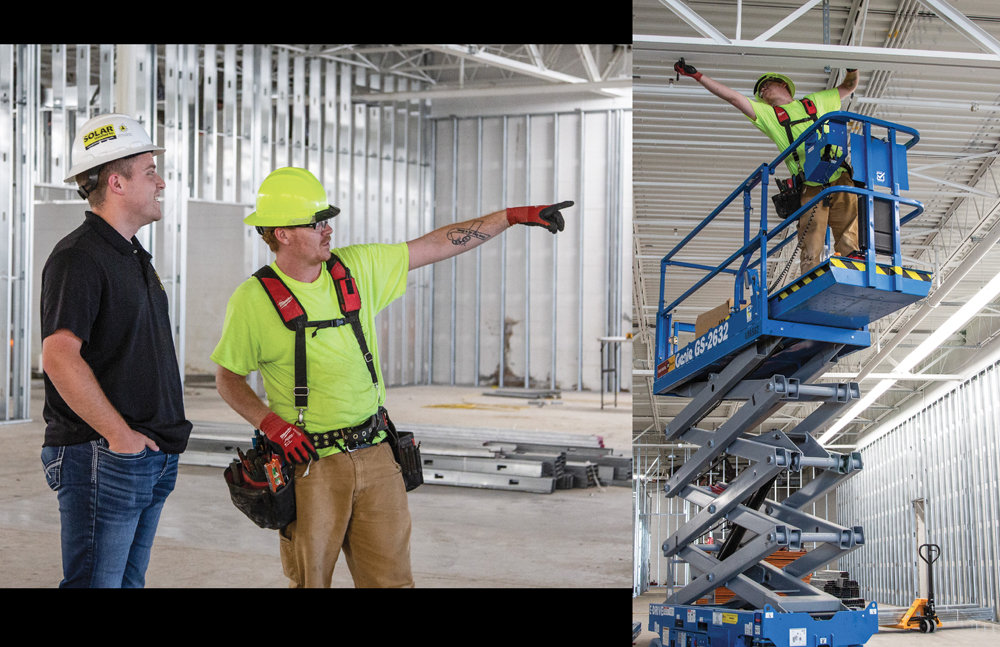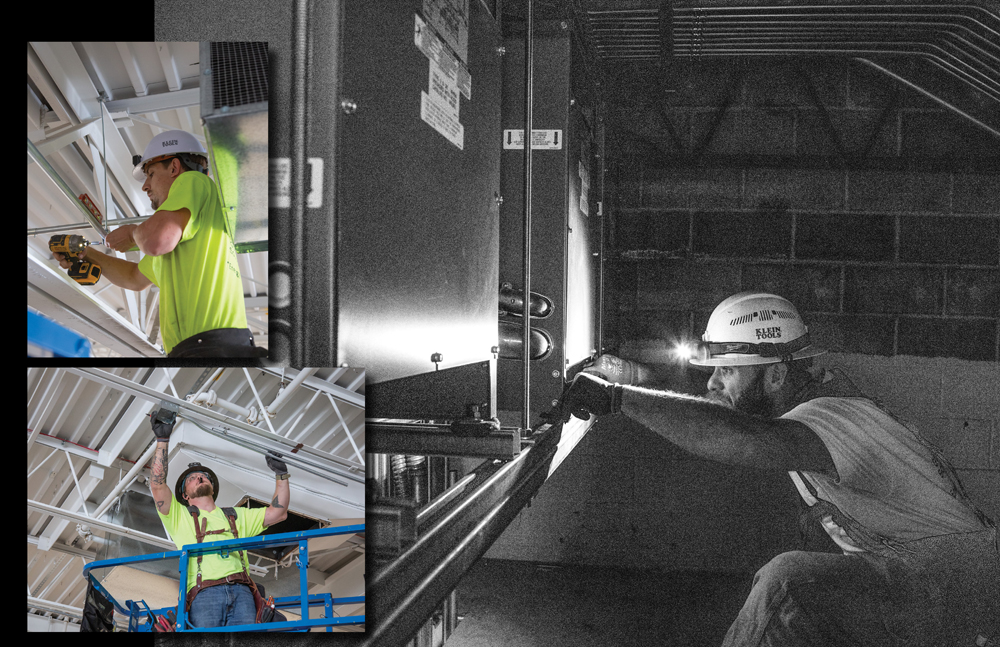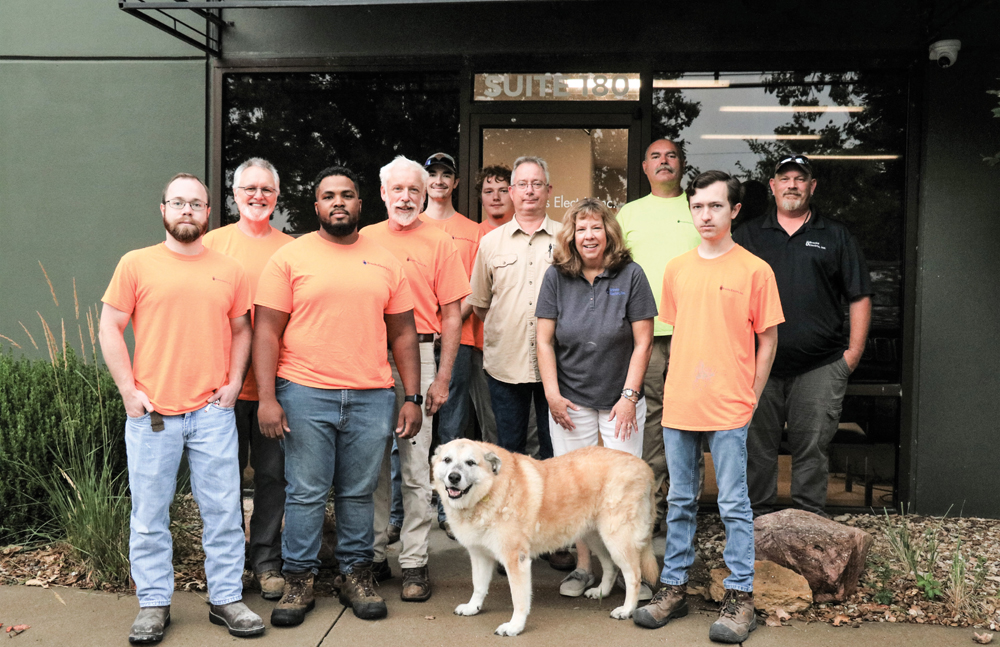| story by | |
| photos by | Steven Hertzog |
| OPEN A PDF OF THE ARTICLE |
Ever-evolving technology keeps electricians constantly evolving and learning new things.

Good Energy Solution remodeling the old Bed & Bath store for the new clothing retailer Burlington Store
Speaking with anyone in the electrical business, you’ll soon discover that whether their focus is on residential, commercial or industrial, the people running the businesses and working for them have a sense of curiosity and a desire to learn. While the basics, such as running cable, haven’t changed much over the decades, the technology has evolved quite a bit, and it’s a constant circuit of learning about new things, learning how to implement those things and then getting them implemented.
“One of the interesting things about being in the electrical trade, in my opinion, is there’s always a new product that could more benefit our customers in some way, whether it’s greater utility or use, or better cost savings for them without compromising on quality or safety,” says Malcolm Proudfit, CEO of Good Energy Solutions (GES). “You’re constantly having to learn and evolve, and keep up and go to trade shows, and communicate with vendor reps and this and that. This doesn’t stop.”
Good Energy Solutions was started in 2007 by owner Kevin Good, with the business’ focus on solar and renewable energy. During the course of those 15 years, they’ve been in the business of installing solar systems for both residential and commercial properties—churches, homes and businesses—along with having been contracted by Evergy to install solar farms on its grid.
Seven years ago, Good Energy Solutions acquired electrical contracting firm JJ’s Electric, along with the expertise of the company’s owner, JJ Willems. It’s now grown into the second division of Good Energy and has a team of 16, as well as multiple millions of dollars in annual revenue. The Good Energy Solutions’ total employee count is about 45.
“We’re glad to have them on board,” Proudfit says of Willems, explaining that solar and electrical contracting work go hand in hand. “Sometimes we have customers that want to get a solar system, but solar feeds into your main breaker panel through a breaker. If you don’t have the room on your panel—if it’s only 100 amps—you got to get a 200-amp panel. Then our solar team will actually have the electrical division do that main panel upgrade, because they’re so much better at it. There’s a lot of complementary skills there.”
Those complementary skills aren’t just between divisions in one company but can be found within singular people, as Patrick Brooks, president of Brooks Electric, explains from his view of the electrical industry after 40 years in the field.
Brooks Electric been in business for 25 years, and it specializes in commercial and industrial wiring, along with a small amount of residential service work. Along with Brooks and his wife, Susan, with whom he co-owns the business, the company has 11 employees.
“Technology has gotten a lot better, and those are things that we have to learn as we go,” Brooks explains. “But being an electrician, you got to learn as you go anyway, because the rules change every three years. Materials change. People’s understanding of how materials have changed to install has also changed. Speed on computer cabling has increased. It’s all changed.”
Keeping up with those changes means that for those who run these businesses, they must remain up-to-date on the latest industry news, while also hiring people who are of the same mindset. GES’s Proudfit sums up what the electrical business needs in an employee: “It’s an industry for people who love to stretch their brain and give themselves a challenge on purpose,” he says. “We, as humans, tend to just take the easy road most of the time, and that’s not the way of the electrician or the plumber, or any tradesman.”
Brooks agrees, saying those who are looking into joining the industry might want to know they’ll be working in heat and cold, hanging from a ladder and required to do a lot of math.
“A lot of math, a lot of math,” he muses. “It’s not just A plus B-type stuff. You got to know a little bit of trig and algebra a little bit. Takes quite a bit of science.”
Brooks says recently, the company was searching for why some LED lights were flickering, and they finally noticed there were surges every time the air-conditioners came on. “It surges the electrical wiring, which makes the lights flicker. That’s science. You gotta know what’s happening, and you learn that by being observant and aware of a lot of different things. It’s a really neat occupation, and it takes a lot of thought, especially if you’re troubleshooting.”
Given the sheer number of electronic devices out there these days and the number of kids being raised on them, one would assume there’d be a healthy number of young people looking to take over from those looking to retire. But that’s unfortunately not the case. According to an NPR “Your Money” story from January 2023, “The application rate for young people seeking technical jobs—like plumbing, building and electrical work—dropped by 49% in 2022 compared to 2020, according to data from online recruiting platform Handshake.”
“I’m just shocked by how few students are going through that type of program,” Proudfit laments. “I’ve sat on the advisory board over at Johnson County Community College for a while in their electrical technology school, and they probably put 40 or 50 students through that program annually.”
He compares this to when he was going through business school when there were a thousand students in his economic program graduating in any given year, with the same number in his master’s program.
“There’s just not enough focus on becoming a tradesman or learning a valuable skill like that,” the GES CEO continues. “It’s not like you couldn’t go out into the field knowing how to be a plumber or an electrician, or anything like that and make six figures. You certainly could, and people do it every day, all the time. I think that’s a stigma that still needs to get resolved in the minds of young high school graduates.”
As Brooks explains, being an electrician is a solidly stable career choice. “I’ve never been out without a job for one day. Even if you aren’t working for just a short time period, somebody’s always looking for a little extra work.”
Both Brooks Electric and Good Energy Solutions draw from schools such as Peaslee Tech, Johnson County Community College and Washburn Tech, and both Brooks and Proudfit recommend those interested in the trades take a few classes as a good baseline before considering applying for jobs. That being said, it’s not just something that appeals to those just out of high school, and there’s a glimmer of hope in that, Proudfit says .
“Initially, when I was making hires in my first year or two here at Good Energy Solutions, it was mainly folks straight out of an electrical technology program or someone coming from another firm with that experience that we were looking for,” he explains. “But we’ve always been happy to train if we were going to hire someone who’s a blank slate, so to speak. We’ll train you up if you’re willing to put in the work.”

Good Energy Solutions CEO Malcolm Proudfit on location for the remodel of the Burlington store; right: Good Energy electricians on site of the remodel
In the last year or two, many people have come in to apply looking to reinvent themselves or make an industry change, Proudfit continues. From car salesmen to concrete workers, and graphic design artists to videographers, they’ve all come in to try something new. And what they bring to the industry is a can-do attitude and a fresh perspective. One of those folks is Good Energy Solutions’ Joe Cottin.
Cottin grew up working in his parents’ store, Cottin’s Hardware & Rental, 1832 Massachusetts St., in Lawrence. After high school, he decided on food services as a career for the next two decades. During those 20 years, he worked for KU Dining, Free State Brewing Co. and most of what he refers to as the “high-volume restaurants in Lawrence.” He went from line cook to shift manager to sous chef.
“I’ve never been a head chef or an executive chef, but that would’ve been the final step as far as my career would’ve gone,” Cottin reflects of his career in that industry. A couple years ago, he came to a point where he needed to make the decision whether he could—or even wanted to—become either an owner/operator or partner of someone who wanted to open up a restaurant, he continues.
“It started making less and less sense to invest all my time and effort into it,” Cottin laments. “The effort that I would have to put in and the amount of financial backing required to get to that highest level of earning, it just seemed unfeasible to me to try, because most restaurants do fail.”
Most of the head chefs and executive chefs for whom Cottin worked in the past sacrificed everything in their lives to be successful. But with Cottin at the point where that was not going to meet his definition of success, the now-electrician looked at other industries he felt capable of entering, which had a much higher ceiling as far as effort versus reward.
“I had always been interested in the trades,” Cottin says of his eventual choice of new career. “My dad, as I was growing up, he would buy a house that was all run down and, while we lived there, he would gut it and repair room by room. When I was little, it would be like, ‘OK, go into this crawl space and pull these wires.’ And he showed me when I was 12 or something how to wire a receptacle. I had that entry-level understanding and confidence in my abilities to do it.”
In addition to not wanting a desk job, he was particularly interested in the green elements of the electrical trade. In his mind, the future of energy was going to be more about technology and sustainability, so it seemed to him like a field that would just keep growing and expanding.
“I’m 39 now, and starting a new career at 38 was definitely not something I thought I would be doing,” Cottin explains. “It just seemed like a really interesting field to me and something that I had enough basic understanding of to think that, even in my later-in-life point, it seemed to be within my capabilities.”
While Cottin’s time in kitchens did not prepare him for the day-to-day activities of electrical work, the soft skills and intangibles of his prior career path certainly put him at an advantage. Working in high-pressure situations, uncomfortable temperatures and somewhat dangerous environments where one has to be very conscious of his or her surroundings were all things with which he was quite familiar.
“No one needed to be looking over my shoulder to make sure I didn’t mess something up,” he explains. “It just became a point where all I had to do was show up to work and absorb as much knowledge as I could from the master electricians and the journeymen.”
LOCAL MATTERS
Our Local Advertisers – Making a Positive Impact
Once they saw that Cottin was willing to learn, it became very much a case of, “Here’s how you do this. Now let me see you do it,” he says. “At 38, I’m not trying to go to community college at night while I’m doing this, so it’s something that I have to spend a lot of time outside of work training myself, learning the code book and researching different techniques and different safety precautions, and things like that.”

Good Energy electricians on site
The mentor/mentee relationship is an important one in whatever career path someone might choose, but it’s especially important within the electrical industry, says Robert Bausch, business manager for the International Brotherhood of Electrical Workers (IBEW) Local Union 226.
“With our apprenticeship programs, you’re underneath a journeyman at all times,” Bausch says. “In other words, they’re responsible for training you, teaching you and keeping you safe. Obviously as you get farther into your apprenticeship, you’re given more responsibilities, but you’ve got a mentor there every day that you’re at work.”
From there, he says, you pass it along. Bausch has even taught some continuing education classes along the way, explaining that the concept of mentorship and being there to answer questions continues even after you’ve gotten off work. He reconfirms what Brooks, Cottin and Proudfit have all said thus far: Learning is key to being a successful electrician.
“I sit on the board of Washburn Tech … and it’s good beginning training,” he explains. “But again, the trade’s so diverse, one year’s just not enough for those guys to pick up enough to be proficient at all of it—or any of it, for that matter. Just enough to kind of get their feet wet.”

Patrick and Susan Brooks with the staff at Brooks Electric
When Bausch topped out of his apprenticeship, he traveled, going to California and Illinois and Massachusetts, some of it by choice and some of it out of necessity. But the thing he points to is that thanks to a solid apprenticeship through the IBEW, no matter where he went, the training he received made it so there was nothing he couldn’t do.
“You can’t see it all, right?” Bausch says. “The trade is so vast that you’re never going to master all of it, but you master enough to know that you can work yourself through any part of the trade that maybe you haven’t seen.”
That’s why the IBEW matters, too, he continues. It’s harnessing the power of the group to make the individual’s position and standing stronger than it would be on his or her own.
“This is probably more of a broader spectrum of labor and construction labor, but would you have a voice?” posits Bausch about the absence of a union, pointing to the fact that there are trade organizations for the companies that employ the electricians and represent those companies, and make their collective voice heard all the way up to the legislative level.
“As workers, we don’t have that unless we have a union to do that,” he explains. “Whereas with a group voice, we have much more power—at least at the table—to talk about the issues that affect us on a daily basis, whether it’s safety or having a job that just can’t let you go because they didn’t like the color of the shirt that you wore that day.”
When job safety is ensured, then electricians can concentrate on learning and expanding their knowledge, which makes them happier better at that job.
“I do enjoy showing up to work and getting to learn a lot, which is something that started falling off in my previous career,” Good Energy’s Cottin says. “I got into the mode of, ‘I know pretty much everything I can learn,’ and just showing up and doing the routine became very draining. … I didn’t see a great future in it.”
With electrical, there’s always new stuff to learn, he adds. There’s always new technology coming out, and if he gets bored doing residential, he can switch over to commercial or start installing security systems.
“There’s always a different avenue to go down and learn and advance in, and I don’t really see that dying off anytime soon,” the former kitchen employee says. “I’ve learned so much in the last year doing it that I feel like I’m just scratching the surface, honestly.”
While Cottin’s only been at it a little over a year, the 40-year veteran president of Brooks Electric agrees.
“It’s fun for me to try to figure something out and make it work and make the lights go on or the air-conditioning come on in the summer,” Brooks jokes. “People really like you when you bring the air-conditioner back on. You’re very popular.”





